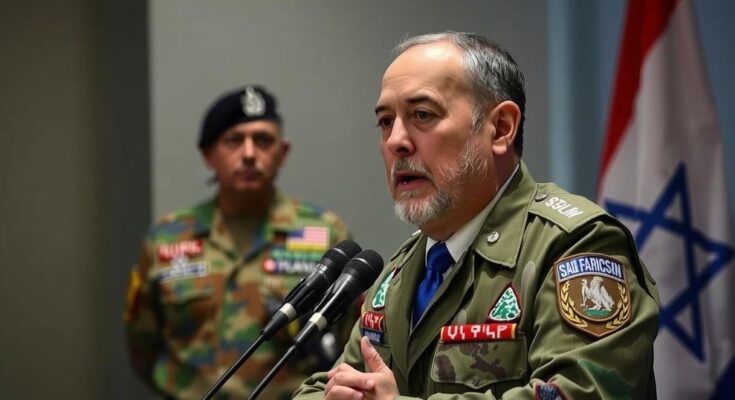Israeli Defense Minister Israel Katz has ruled out a ceasefire in Lebanon, insisting on continued military action against Hezbollah with the aim of disarming the group. This stance contrasts with the Foreign Minister’s earlier claims of positive developments in ceasefire discussions. The ongoing conflict has resulted in substantial casualties, with over 3,000 dead in Lebanon alone, prompting widespread displacement and a humanitarian crisis.
In a recent development, Israeli Defense Minister Israel Katz has unequivocally stated there will be “no ceasefire” and “no respite” in Lebanon amidst ongoing military operations. His remarks come in the wake of significant Israeli airstrikes and ground incursions, which have claimed the lives of over 3,000 individuals. Katz expressed on social media that Israel’s military actions will continue until their objectives, specifically disarming Hezbollah and ensuring the safety of northern residents, are met. His statements starkly contrast earlier comments made by Foreign Minister Gideon Saar, who suggested that progress was being made toward a ceasefire, though Hezbollah’s representatives denied participation in such discussions. Moreover, the humanitarian crisis in Lebanon has escalated significantly, with around 1.2 million individuals reportedly displaced due to the Israeli military campaign. This situation has also prompted tens of thousands of Israelis to evacuate northern areas in response to incessant rocket attacks from Hezbollah and other factions. Katz’s recent appointment to the defense ministry followed the dismissal of Yoav Gallant, attributed to strategic disagreements with Prime Minister Benjamin Netanyahu, who is currently facing scrutiny over alleged war crimes related to the Gaza conflict. The conflict has resulted in substantial casualties, with the Lebanese Health Ministry reporting 3,243 deaths and 14,134 injuries since early October 2023 in Lebanon, amidst a larger humanitarian crisis in Gaza, where fatalities have surpassed 40,000. The international community is expressing concern over the continuous military actions, alongside limited humanitarian aid reaching affected regions, which has dwindled considerably despite U.S. pressures for increased assistance. Furthermore, discussions at the Arab League and Organisation of Islamic Cooperation summit reflected the dire circumstances in Lebanon, with Prime Minister Najib Mikati highlighting the existential threats faced by his nation. Meanwhile, comments from Iranian officials indicate anticipation for a shift in U.S. administration influences that could impact regional hostilities.
The current situation in the Middle East, particularly in Lebanon, stems from escalating tensions between Israel and Hezbollah, with Israeli forces launching extensive military operations in response to perceived threats. Israel has declared its objectives in Lebanon are to neutralize Hezbollah’s military capabilities, which they view as a necessity for their national security. The conflict has resulted in a humanitarian crisis affecting both Lebanese civilians and Israeli citizens, prompting international discussions about ceasefires and humanitarian assistance, amid accusations of war crimes against Israeli leadership. The geopolitical landscape is further complicated by changes in Israeli government leadership and dynamics in the region, which are influenced by broader international relationships, particularly with the United States and Iran. The ongoing violence has exacerbated the humanitarian situation, causing widespread displacement and civilian casualties while sparking calls for diplomatic negotiations and cessation of hostilities.
In conclusion, Israeli Defense Minister Israel Katz’s declaration against a ceasefire in Lebanon underscores the intense military engagement and the stark humanitarian crisis unfolding in the region. The contrasting statements from various Israeli officials reflect the complexities in addressing both military objectives and humanitarian needs. As the conflict continues with significant casualties and displacement, there is an urgent call for resolutions that prioritize civilian safety and facilitate humanitarian aid amid escalating hostilities between Israel and Hezbollah.
Original Source: www.theguardian.com




